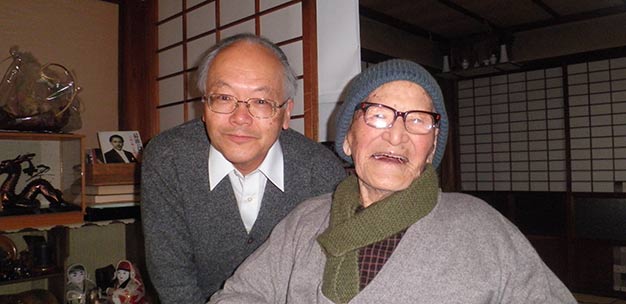Keeping inflammation at bay can help people live past 100
Published online 26 November 2015

Keio researcher Nobuyoshi Hirose (left) with the oldest man in history, Jiroemon Kimura, who died in 2013 at the age of 116.
© 2015 Nobuyoshi Hirose, Keio University
A large study of the elderly in Japan has found that having low levels of inflammation in the body is the most important predictor of a long and healthy life1.
The findings suggest that drugs that regulate the body's immune system could also help people remain mentally sharp and disease-free well into their 80s, 90s, 100s, and possibly beyond. "Anti-inflammatory medications are a potential intervention to slow aging," says Yasumichi Arai, a geriatrician-scientist at Keio University School of Medicine in Tokyo.
About 0.05 per cent of Japan's population is aged 100 and older, which means the country has more so-called centenarians per capita than anywhere else in the world. Arai and his colleague Nobuyoshi Hirose (see image) have been studying these elderly people for more than 15 years.
In 2000, they launched the Tokyo Centenarians Study to look at people aged 100 years and older; in 2002, they began the Japanese Semi-supercentenarians Study to examine those over 105; and in 2008, they started the Tokyo Oldest Old Survey on Total Health, which considered people aged 85 and up. All participants in these studies underwent extensive medical examinations, including DNA analyses, cognitive studies and various physiological functions tests.
Arai, Hirose and their colleagues pooled data from the various cohort studies, including some of the centenarians' children, and, in total, investigated the health of 1,554 individuals to determine the most important biological driver of successful aging. They found that low levels of markers for chronic inflammation trumped all other indicators of whether a person might reach extreme old age, including blood cell numbers, metabolism, and liver and kidney function.
The Keio team also looked at the length of telomeres ― the caps at the end of chromosomes that are thought to continuously shorten with age and eventually lead to the cessation of cell growth ― in collaboration with researchers at Newcastle University in the United Kingdom. They found that telomere size was not a predictor of successful aging, although most of the centenarians and their children managed to maintain long telomeres.
"People with the lowest inflammatory burden have the best chance of survival, and have higher physical and cognitive function," Arai says.
Arai is now looking for safe and effective anti-inflammatory drugs that could be prescribed to improve the quality of life of older people. "Because aging is the greatest risk factor for a majority of chronic diseases," Arai says, "interventions targeting aging itself are promising to elongate human health-span."
Reference
- Arai, Y. et al. Inflammation, but not telomere length, predicts successful ageing at extreme old age: A longitudinal study of semi-supercentenarians. EBioMedicine 2, 1549-1558 (2015). | article